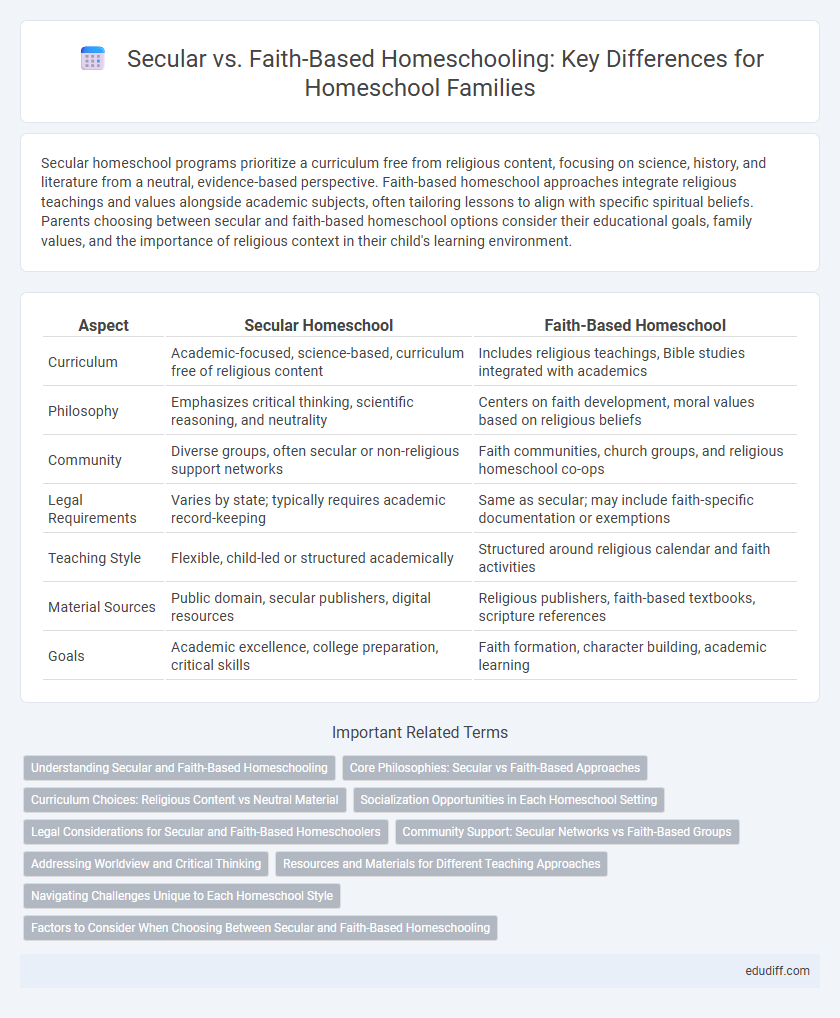Secular homeschool programs prioritize a curriculum free from religious content, focusing on science, history, and literature from a neutral, evidence-based perspective. Faith-based homeschool approaches integrate religious teachings and values alongside academic subjects, often tailoring lessons to align with specific spiritual beliefs. Parents choosing between secular and faith-based homeschool options consider their educational goals, family values, and the importance of religious context in their child's learning environment.
Table of Comparison
| Aspect | Secular Homeschool | Faith-Based Homeschool |
|---|---|---|
| Curriculum | Academic-focused, science-based, curriculum free of religious content | Includes religious teachings, Bible studies integrated with academics |
| Philosophy | Emphasizes critical thinking, scientific reasoning, and neutrality | Centers on faith development, moral values based on religious beliefs |
| Community | Diverse groups, often secular or non-religious support networks | Faith communities, church groups, and religious homeschool co-ops |
| Legal Requirements | Varies by state; typically requires academic record-keeping | Same as secular; may include faith-specific documentation or exemptions |
| Teaching Style | Flexible, child-led or structured academically | Structured around religious calendar and faith activities |
| Material Sources | Public domain, secular publishers, digital resources | Religious publishers, faith-based textbooks, scripture references |
| Goals | Academic excellence, college preparation, critical skills | Faith formation, character building, academic learning |
Understanding Secular and Faith-Based Homeschooling
Secular homeschooling emphasizes a curriculum based on empirical evidence, critical thinking, and academic rigor without religious content, appealing to families seeking a non-religious education environment. Faith-based homeschooling integrates spiritual teachings and religious values within core subjects, often utilizing curricula aligned with specific denominations to reinforce moral development alongside academic learning. Understanding these approaches helps parents choose a homeschooling path that aligns with their educational goals and worldview.
Core Philosophies: Secular vs Faith-Based Approaches
Secular homeschool approaches prioritize critical thinking, evidence-based learning, and a curriculum grounded in science and reason, free from religious doctrine. Faith-based homeschooling integrates religious beliefs as a core component, emphasizing spiritual development alongside academic subjects. These contrasting core philosophies shape not only content choices but also teaching methods and family values within the homeschooling environment.
Curriculum Choices: Religious Content vs Neutral Material
Secular homeschool curricula prioritize neutral material, emphasizing science, history, and literature without religious perspectives, offering a broad, unbiased education. Faith-based homeschool programs integrate religious content, tailoring lessons to align with specific spiritual beliefs while incorporating standard academic subjects. Parents choose between these approaches based on the desired balance of academic rigor and religious upbringing.
Socialization Opportunities in Each Homeschool Setting
Secular homeschool environments often emphasize diverse socialization opportunities through community co-ops, extracurricular activities, and public events, fostering interaction with peers from varied backgrounds. Faith-based homeschool settings typically offer socialization within church groups, religious activities, and faith-oriented homeschool networks, promoting shared values alongside peer relationships. Both approaches aim to support social development but differ in the cultural and ideological contexts shaping children's social experiences.
Legal Considerations for Secular and Faith-Based Homeschoolers
Secular and faith-based homeschoolers must navigate varying legal requirements depending on their state or country, including registration, curriculum approval, and record-keeping. Faith-based homeschooling sometimes benefits from religious exemptions that allow greater flexibility in curriculum content or reporting, while secular homeschoolers often adhere strictly to public education standards to maintain compliance. Understanding local homeschooling laws is essential for both groups to avoid penalties and ensure children receive legitimate educational credentials.
Community Support: Secular Networks vs Faith-Based Groups
Secular homeschool communities often provide diverse networks that prioritize inclusivity and a variety of educational philosophies, fostering connections through local co-ops, online forums, and social events. Faith-based homeschool groups emphasize shared religious values and moral teachings, creating a tightly-knit environment centered on spiritual growth alongside academic support. Both secular and faith-based groups offer unique community support structures that enhance the homeschooling experience through collaboration, resources, and emotional encouragement.
Addressing Worldview and Critical Thinking
Secular homeschool curricula emphasize critical thinking by encouraging students to analyze information through evidence-based reasoning without religious influence, fostering an open-ended exploration of diverse worldviews. Faith-based homeschool programs integrate religious principles within their lessons, shaping students' worldview according to specific doctrinal beliefs while promoting critical thinking skills aligned with their faith. Both approaches aim to develop analytical abilities but differ in how they address the origins of knowledge and moral reasoning.
Resources and Materials for Different Teaching Approaches
Secular homeschool resources emphasize diverse, evidence-based materials including science textbooks, history resources, and literature free from religious interpretation, often sourced from publishers like Khan Academy and CK-12 Foundation. Faith-based homeschool curricula integrate religious texts and values alongside standard subjects, with providers such as Abeka and Sonlight offering tailored lesson plans that reinforce spiritual beliefs. Access to online communities and specialized teaching aids further supports both secular and faith-based approaches, ensuring families can select compliant educational tools that align with their philosophical preferences.
Navigating Challenges Unique to Each Homeschool Style
Secular homeschool families often face challenges related to finding curriculum and community resources that align with their non-religious values, while faith-based homeschoolers navigate integrating religious teachings with academic standards. Both styles require tailored socialization opportunities and support networks to address their unique educational philosophies. Understanding these distinctions helps parents develop strategies that best suit their homeschool goals and children's needs.
Factors to Consider When Choosing Between Secular and Faith-Based Homeschooling
When choosing between secular and faith-based homeschooling, parents should evaluate their educational goals, family values, and curriculum preferences to ensure alignment with their desired worldview. Understanding the legal requirements and support networks available for each approach is essential to provide a structured and compliant learning environment. Assessing socialization opportunities and access to diverse resources further influences the decision by impacting the child's overall development and exposure.
secular homeschool vs faith-based homeschool Infographic

 edudiff.com
edudiff.com